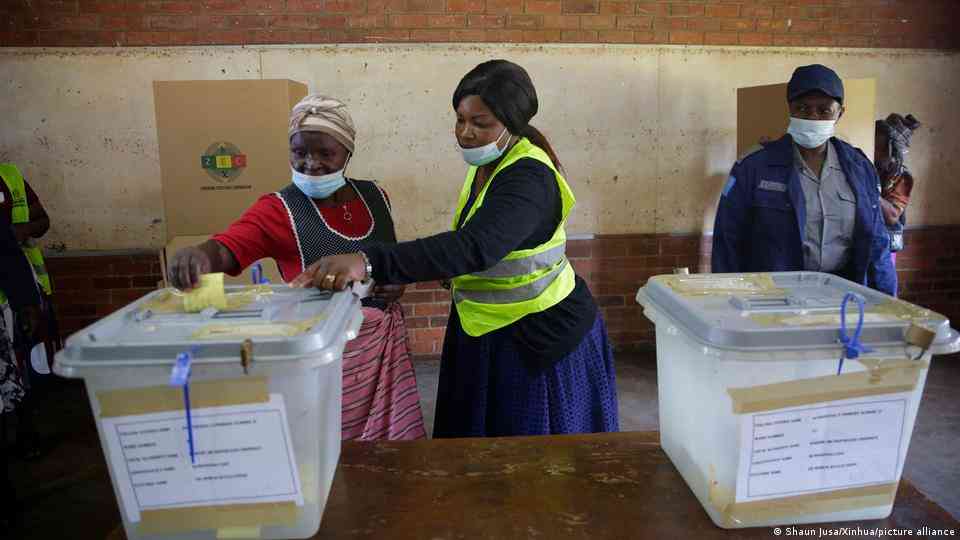
In terms of the Zimbabwean constitution the conduct of elections is provided for in accordance with the provisions of Chapter 7 Sections 155-161.
Section 155 deals with the principles of the electoral system which are basically guidelines to electoral conditions and activities.
In Zimbabwe elections are held every five years and are harmonised.
This means as provided in Section 158(2) General elections to local authorities must take place concurrently with presidential and parliamentary elections.
By-elections, which is the filling in of vacancies that occur in any elective public office in terms of the constitution of Zimbabwe, must occur within ninety days of the declaration of a vacancy.
The finer details of the guidelines in the conduct of both General elections and by-elections are in terms of An Act of Parliament, in this case the Electoral Act.
Chapter 2.13. Zimbabwe’s Electoral system is characterized by first past the post (FPTP) for all local authority wards and all parliamentary constituencies as delimited by the Zimbabwe Electoral Commission (Zec), which is the constitutional board that is mandated to deal with elections to public office.
In addition, to this there is a proportional representation system that accounts for a certain number members of the upper House (Senate) of Parliament, women and youth quotas in the General Assembly as well as in local authorities.
- Combating corruption in public procurement
- Zim must stop targeting civil society organisations
- Rights groups launch constitutional literacy book
- Absence of Nec for media industry violates labour rights of journalists
Keep Reading
Since independence Zimbabwe has held numerous by-elections to fill vacancies that have occurred due to a number of reasons in between general elections. While this is not an occurrence just in Zimbabwe it is common in many other democratic nations.
However, byelections in Zimbabwe have proven to be costly, time-consuming, and sometimes disruptive to the governance processes.
Given that over the past two decades Zimbabwe has experienced serious economic challenges, exploring possible alternatives to by-elections could offer more efficient and effective ways to ensure democratic representation and governance continuity.
Due to the provisions of Section 129 (k), of the constitution of Zimbabwe, the nation has witnessed an upsurge in by-elections resulting from internal party governance challenges or conflicts.
The past two decades have witnessed an unprecedented evocation of this section, especially in the opposition, triggering huge numbers of by-elections.
This has practically made Zimbabwe an election-mode-centric nation.
Between the 2013 and 2018 General elections this clause triggered over twenty-one (21) by-elections at one go.
Between 2020 and 2023 it saw over forty (40) by-elections for vacancies in the National Assembly constituencies and hundreds of local authority wards.
Four months after the August 2023 general elections the clause caused 15 National Assembly by-elections and many local authority ones.
The first quarter of 2024 has already had its fair share of by-elections triggered by the evocation of the same clause.
These developments call for a rethink on the efficacy of by-elections to fill vacant posts in elected public office given the disruptive experiences socio-economically, politically and in terms of governance.
This current electoral system, based on the First Past the Post (FPTP) method, has created challenges when it comes to filling vacant seats in the National Assembly and local authorities between general elections.
By-elections triggered by the wanton evocation of Section 129 (k), have proved to be costly and time-consuming.
It is also evident they may not always produce representative outcomes given the massive voter apathy characterising the processes.
In reality by-elections may not be the most practical or efficient option to fill vacancies in elective public office positions for now and in the future.
Introducing a party list electoral system, could mitigate the need for frequent by-elections.
In the event of a vacancy, the vacant seat could be automatically filled by the next candidate on the party's list, as determined during the previous general election.
This system promotes continuity and ensures that the party maintains its representation in the legislature without the need for additional elections. Integrating this into the existing FPTP system may be a viable alternative to by-elections while ensuring democratic representation.
This system offers a practical solution for filling vacant seats in elected public office positions.
The party list can be compiled in the same way as the proportional representation list.
However, the difference would be that the numbers will be equal to the constituencies or wards.
For example Manicaland province has 26 constituencies.
Party A which contested in Manicaland provides a list of 26 names in Zebra fashion starting with a woman.
Each of the seven districts of Manicaland will have names on the list with numbers proportionate to the number of constituencies in each district.
Makoni district for example has five constituencies it will supply five names on the list.
Nyanga district has two constituencies and it will supply two names on the list.
For the local authority, each party, for each ward, must have a representative on the party list.
If the candidate in the general election was male then the party list name should be female and vice versa.
Those on the party list must not have participated as candidates in the general election.
There are a number of possible advantages associated with integrating the party list system with the existing first past the post system with regards to enhancing the democratic landscape of the country.
By integrating party lists system with the existing first past the post system, Zimbabwe can address some of the shortcomings associated with winner-takes-all politics while preserving the advantages of local representation, inclusivity, accountability and effective governance.
It has been clear that women have been heavily marginalized in the first past the post battle for power survival.
With the party list they stand a chance as the list will cover the short changing they receive in the general election survival of the fittest initial contest.
Whenever, a vacancy arises in the male dominated seats they will be the first to benefit.
This hybrid approach promotes fairness, gender equity and inclusivity and effective governance, ultimately strengthening Zimbabwe’s democratic institutions.
Utilising the party list system to fill electoral vacancies removes the need for conducting byelections, thereby saving time and resources for both the state, the electoral commission, individuals and political parties.
It streamlines the process of maintaining a fully functioning governance system.
Unlike with by-elections, which can result in prolonged periods of underrepresentation or non-representation for constituents, filling vacancies from the party list ensures immediate continuity of representation.
This is particularly important in addressing urgent legislative matters and maintaining effective, stable governance and decision making at both national and local levels.
The party list system while ensuring continuity of representation, can uphold the democratic mandate of political parties initially given by the electorate in the general election.
In Zimbabwe's electoral framework, incorporating party lists to address vacant seats within the FPTP system can enhance representation and streamline the electoral process.
The legislature and local authorities are made to be always fully subscribed regardless of vacancies having occurred due to the various circumstances.
While ensuring immediate continuous representation this system has great potential to minimize disruptions in parliamentary and local authority proceedings.
With vacancies quickly filled from party lists, the national legislature and councils can function effectively, address pressing issues, and make informed decisions on behalf of the electorate.
Party lists offer flexibility in responding to vacancies, allowing parties to adjust their representation based on changing circumstances and electoral dynamics.
Parties can update their lists periodically to ensure that they reflect the evolving needs and preferences of the electorate.
In Zimbabwe's electoral landscape, integrating party lists within the FPTP system offers a pathway to promote and ensure continuity of representation and upholding the democratic principles of inclusivity and accountability.
This approach promotes stability and effectiveness in governance, allowing for the seamless transition of representation in the national legislature and local authorities.
This can actually move our country towards the trajectory of meritocratic democracy.
*Earnest Nyamukachi is peace and governance advocate









